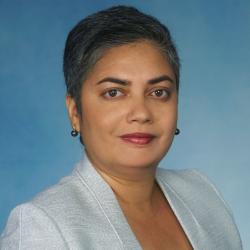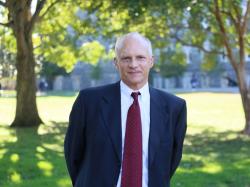

10:00 am EDT - 3:00 pm EDT
Past Event
On September 23, the Brookings Institution’s Global Economy and Development program, in collaboration with Harvard University’s Center for International Development, hosted a virtual symposium to discuss the findings of four articles on the Washington Consensus published in the Summer 2021 issue of the Journal of Economic Perspectives (JEP). The symposium included panels of academic experts, international policymakers, and members of civil society who gathered to discuss three decades of evidence on the impact of the Washington Consensus policies on economic outcomes in various regions of the world.
Brahima S. Coulibaly opened the conference by observing the importance of revisiting the Washington Consensus policies, particularly during this very challenging political and economic environment. To overcome these challenges, countries will need to initiative reforms to build back better in the post-COVID world and to bolster the resiliency of their economies against future shocks. He asked whether these institutions and national policymakers will pursue the same policies or whether they will adjust their policy frameworks and implementation strategies in light of the new evidence presented in the JEP papers.
Coulibaly shared four important lessons on reforms based on the findings in the papers, as well as his own assessments: First, meaningful reforms are inherently disruptive and often create hardship in the short term, which remedial measures can help minimize the impact on the most affected segments of the populations. Second, when it comes to reforms, one size does not fit all: Each reform policy must be carefully considered against institutional contexts, initial conditions of development, and socio-political environments, among other factors. Third, ownership of the reform agenda by local governments with stakeholder buy-in is important to encourage support for the reforms and to increase the likelihood of success. Fourth, even with the right reform agenda and implementation plan, success is not guaranteed, and preceding incrementally, learning lessons from early implementation, and making necessary adjustments before scaling up can be helpful. In sum, reforms should be a process of continuous reevaluation, adjustment, and recalibration over the reform period, and should be approached with flexibility and humility.
In the first session and panel, Anusha Chari presented work, co-authored with Peter Blair Henry and Hector Reyes, on the “Baker Hypothesis.” This 1985 proposal by James A. Baker III enumerates a core set of economic policy reforms—including inflation stabilization, trade liberalization, greater openness to foreign investment, and privatization—with the twin goals of reestablishing access to international capital markets and spurring growth in “third world” countries.
The paper takes Baker’s “if-then” claim seriously to show that if countries implement and maintain certain economic reforms, they will grow faster after the reform than they did before implementation. Session moderator Carmen Reinhart noted that it was only with the substantive debt restructuring embodied in the Brady plan that countries could successfully embark on the path to reform and allow growth to ensue. Drawing from the lessons from the past, Penny Goldberg argued for inclusive, sustainable, and green growth for the future. Anusha Chari suggested that Baker’s speech provided a compass, not a map, and that higher standards of living required a sustained commitment to a pragmatic growth strategy consisting of an optimal mix of country-specific, efficiency-enhancing policy changes for each nation.
In conclusion, the panelists concurred that while macroeconomic stability and economic efficiency are not sufficient conditions for a flourishing society, they are absolutely necessary prerequisites. Economic activity does not implode in countries with low inflation and modest debt and that export goods they produce efficiently while importing those that they do not. As the fortunes of nations ebb and flow, it is important to remember these realities.
In his presentation, Ilan Goldfajin highlighted the tension between reforms and the sometimes disappointing growth outcomes from the reforms championed by Washington Consensus proponents in Latin America. He presented the evidence from his JEP paper, written with Lorenza Martinez and Rodrigo Valdes, using regional data and case studies from Brazil, Chile, and Mexico to examine the effects of Washington Consensus policies on economic growth and macroeconomic stability. He highlighted the mixed results of these policies, which saw improved macroeconomic stability but heterogeneous and, overall, not as encouraging results for economic growth. An informative discussion by Laura Alfaro, Alejandro Werner, and Jose De Gregorio highlighted the political economy constraints faced by Latin American countries in implementing and maintaining these policies.
Belinda Archibong presented her JEP paper, co-authored with Brahima S. Coulibaly and Ngozi Okonjo-Iweala, related to evidence from African countries in the three decades after the initial Washington Consensus policies were implemented—comparing poor economic growth outcomes over the 1980s and 1990s to the growth boom of the post-2000 period. Focusing on three critical reforms of privatization, fiscal discipline, and trade openness, she relayed that reform adopters experienced significant improvements in economic growth in the post-2000 period, more than the non-reformers over this period. The experience of three country case studies—Nigeria, Ethiopia, and Uganda—provided valuable lessons for when reform can be effective in improving economic performance.
The experiences in Nigeria and Uganda also highlighted the importance of local ownership of reforms so that governments do not perceive “Washington” outsiders forcing reform in exchange for much-needed loans and debt relief. Also highlighted was the importance of centering pro-poor policies and social spending on health and education, in addition to policies like fiscal discipline and trade openness, as key to reform success.
During the session discussion, Bill Easterly raised questions around whether the lack of growth in the 1990s resulted from the Washington Consensus reforms or whether countries were not fully implementing these reforms. He suggested the post-2000s growth could be partly attributed to the implementation of the reforms, highlighting the role of local ownership reflected in the democratization movements of the late 1990s and 2000s in sub-Saharan Africa. The discussions between the speakers also underscored the importance of reforms led by local African economists and leaders. The moderator, Peter Blair Henry, also highlighted the importance of thinking through the role of these reforms in structural transformation in Africa, leading to an exchange with Archibong about the role of politics and policy in shaping the effects of reforms on economic growth and development.
In the final panel, Michael Spence emphasized the importance of interpreting the Washington Consensus as a guide rather than a prescriptive formula for economic development. He noted that when viewed in this way, the Washington Consensus has been helpful for economic development around the world but also noted past issues with using it as a guide: Sometimes policymakers treated it as an “a la carte menu,” picking reforms they liked or that were easier to implement, while leaving out others that were too difficult—a sub-optimal strategy for economic development. He also mentioned the importance of structural change as a key element of sustained high growth and development. He argued that the Asian experience serves as a lesson for why different regions and policymakers, especially in the developing world, may be suspicious of applying models built for advanced economies and financial systems and urged that the Washington Consensus not be viewed as a one-size-fits-all development model. Economic development must always be region- and context-specific, though there is value in learning from development cases across regions and borders.
In the discussion following the presentation, Indermit Gill provided nuance about the Asian miracle story by using the often-given example of South Korea, a country that experienced significant economic growth prior to the Washington Consensus. He argued that South Korea did, however, implement policies consistent with the Washington Consensus, such as those that helped secure fiscal balance, property rights, a broadened tax base, and financial liberalization, which contributed to its significant growth miracle. Gill’s overall takeaway was that Washington Consensus reform adopters seemed to do better in economic growth over the medium to long run but that the experience was heterogeneous and tempered by the local and political economic constraints faced by different countries.
Célestin Monga pushed back against the idea that in the 1980s and 1990s, the Washington Consensus policies were merely prescriptive. He stated that international financial institutions in Washington handed down the policies as strong mandates and that since these policies were not locally owned, they often led to significant hardships for African countries over the 1980s and 1990s. Monga called for a more careful study of the implementation of these policies in African countries and a “Bamako Consensus” centering on the preferences and experiences of African countries in economic development policy. Moderator David Wessel ended the discussion with an acknowledgment of the potentially problematic nature of the name “Washington” Consensus, with all the speakers agreeing that centering the experiences of individual countries and regions in their own development policy is crucial for getting both the social and political capital needed to spearhead these policies and ensure that they lead to successful economic outcomes for their countries and regions, as well.
Peter Henry closed the symposium with two final thoughts. First, the evidence across the papers and panels leaves little doubt about what policy ingredients countries need to grow: macroeconomic stability; openness (to trade and knowledge flows from the rest of the world); a role for markets in allocating resources; and high levels of saving and investment. But figuring out how to assemble these ingredients into pragmatic and inclusive growth strategies requires governance that holds leaders accountable, even as it gives those leaders agency to design country-specific strategies given local constraints and considerations.
In Partnership With

10:00 am - 10:10 am

10:10 am - 11:10 am
See the Session 1 paper here.
Moderator

Presenter

Panelist

11:15 am - 12:15 pm
See the Session 2 paper here.
Moderator

12:15 pm - 12:45 pm
12:45 pm - 1:45 pm
See the Session 3 paper here.
Presenter

Moderator

Panelist


1:50 pm - 2:50 pm
See the Session 4 paper here.
Moderator

Presenter
Panelist

2:50 pm - 3:00 pm


Landry Signé
February 12, 2026

Louise Fox
February 11, 2026

Jesús Crespo Cuaresma, Homi Kharas, Sourav Suman
February 11, 2026